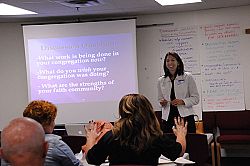Ecumenical gathering urges adding voices to prison reform
Friday, Sep. 12, 2014

Intermountain Catholic
+ Enlarge
Jean Hill, Catholic Diocese of Salt Lake City government liaison, talks to an ecumenical group whose members are interested in the role of faith communities in criminal justice reform. IC photo/Marie Mischel
SALT LAKE CITY — More than two dozen people from across the spectrum of Utah’s faith communities gathered on a Saturday morning to discuss ways that their congregations could help address criminal justice concerns in their communities.
Catholics, members of The Church of Jesus Christ of Latter-day Saints and various Baptist churches and a representative of the Islamic community as well as others discussed how to interrupt the prison pipeline, which sees more than two-thirds of prisoners returning to their cells because of parole or probation violations rather than for new crimes.
‘Breaking Every Chain’ was organized by the Catholic Diocese of Salt Lake City, the Utah Prisoners’ Advocate Network, and Calvary Baptist Church, which hosted the Sept. 6 gathering. Speakers were Jean Hill, Catholic Diocese of Salt Lake City government liaison; and ACLU of Utah representatives Anna Brower and Kathy Abarca.
Two-thirds of those in Utah’s prisons were sentenced for nonviolent crimes, the most common being possession of a controlled substance. Drugs and/or mental health issues are behind many criminal offenses, Hill said, and asked those at the gathering whether their congregations or communities offered support systems to people who require drug treatment or are unable to get housing – a problem for many parolees because Good Landlord programs prohibit renting to felons.
Among the half dozen Catholics who attended the gathering were Matt and Patty Bedel of Saint Joseph Parish in Ogden, who volunteer with the diocesan jail ministry. The Bedels hoped to get about ideas about how to help those who finish their sentences, Matt Bedel said.
“The big gap that we have is when they do leave there, we have nothing for them,” said Matt Bedel, who has been ministering at the Weber County Jail for about nine years and sees many people return six months or a year after their release.
Having people like the Bedels meet with others who are working on prison reform issues at different levels was a positive outcome of the meeting, said Brower, an ACLU public policy advocate.
During her presentation, Brower said, “There’s a lot more energy and interest and motivation and excitement around criminal justice reform in our state right now, and that is a very, very good thing.”
Prisons pose an enormous problem, not just fiscally – she described the Utah Department of Corrections’ annual budget of more than $260 million as “woefully underfunded” – but also because of the human cost in terms of why people are in prison, why their terms are so long and parole is so difficult to obtain, she said.
While the relocation of the prison in Draper has garnered plenty of media attention, these other issues are essential to address, Brower said. “It’s hard to get people to understand that this is an important place to spend money. If we don’t want two-thirds of our people going back in, we need to be doing this better, so we need an initial investment of funding.”
However, she sees signs that the Utah Legislature is interested in more than just proposed sites for a new prison, how large it will be and how much it will cost. In the 2015 legislative session, Brower said, “there will be substantial support for more mental health and substance abuse addiction treatment statewide.”
Because legislators will be hearing about these issues, “they need to know that the public cares and wants the funding for this system and wants the system to function as it should so that when people come back to our congregations and communities, they’re not going to go right back into prison,” Hill said.
For questions, comments or to report inaccuracies on the website, please CLICK HERE.
© Copyright 2024 The Diocese of Salt Lake City. All rights reserved.
© Copyright 2024 The Diocese of Salt Lake City. All rights reserved.

Stay Connected With Us